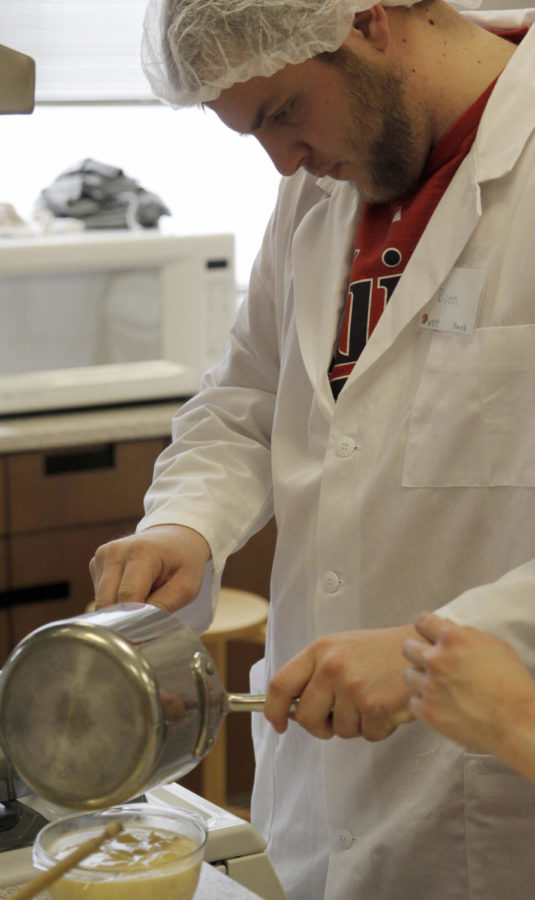Dietetics program changes increase competitiveness among students
February 27, 2014
The dietetics program at Iowa State is becoming more competitive by changing its curriculum and guidelines.
“People are attracted to Iowa State because it’s known for its dietetics program,” said Alison St. Germain, instructor for the dietetics internship program and clinician for the food science and human nutrition department.
St. Germain said Iowa State is known for having the largest dietetic internship in the nation.
It’s not just the program itself that captures the public eye, but also the faculty and staff.
“We have highly-qualified faculty and staff who work with the dietetics program and our students. Students receive excellent academic training, as well as individualized guidance from advisors and faculty,” said Pamela White, dean of the College of Human Sciences.
The strong undergraduate program is going to become more competitive for students. Coming up in fall 2014, once students make it into the system, the competition begins.
The first two years in the dietetics program is titled pre-dietetics. This includes courses that will introduce the student to the basic principles and practices of human nutrition and sciences, such as organic chemistry, biology and human anatomy.
After the student has completed the first two years in pre-dietetics, he or she must meet the requirements to apply for the official program.
In addition to a GPA of 3.0 or higher, there is an application process and consideration of volunteer work in the field.
“It’s kind of stressful going into it, applying. You spend basically your whole fall semester of your senior year preparing your application,” said Sarah Wenum, senior in dietetics. “You have to even start thinking of [the application] before the fall of your senior year.”
St. Germain said the reason for these requirements is so that Iowa State will be “putting out high-quality dietetics students that will be eligible for the dietetic internship.”
The Iowa State Dietetics Internship receives its accreditation from the Accreditation Council for Education in Nutrition and Dietetics by the Academy of Nutrition and Dietetics.
According to St. Germain, the students will undergo 1,250 hours of this fast-paced internship.
“You want to have things to put on your application that are going to make you stand out as a strong applicant,” Wenum said.
During the six-month period, students undergo five weeks of training in community settings, like sports facilities or geriatric organizations.
“I have been looking at internships, focusing on food service management, and we’ve definitely had classes that will be beneficial for an internship, and all internships for that matter,” Wenum said.
The next five weeks of the internship fit right in that category. There is training in food service management, like serving food in a hospital.
“A course that I have felt that has benefited me was HRI 380 Lab, which is basically a student-run restaurant on campus,” Wenum said.
In this lab, students are taught how to work as a kitchen manager and work in the food service industry. This involves ordering, purchasing and the receiving of food items.
“I think it will be beneficial because it was a hands-on experience and will be directly related to what we’ll be doing in our actual internship,” Wenum said.
Then there will be 15 weeks in medical therapy, which are in hospitals and outpatient systems.
“It’s competitive now, but its going to be probably more so [with students] having to have a 3.0 GPA,” St. Germain said.
For those who do not qualify for the dietetics program, opportunities to pursue and move forward in the nutrition, wellness and health program is an available option.
This new program is focused on education and community-based systems in health studies. It is not as highly science-based as the dietetics program would be if a student were to continue on in that program. He or she wouldn’t work medical-type cases, like a dietitian would and are not eligible to take the registered dietitian exam.
After a student graduates from the dietetics program with a bachelor’s degree and he or she passes the ISU dietetic internship, the register dietitian exam is next on the agenda. A student is eligible to sit for the registration exam to earn the title.
“[An RD is] a nutrition expert because they have all this science and biochemistry to help those who have medical problems,” St. Germain said. “The RD title shows that a student has “gone through four years of school, gone through an internship and then taken the registration exam.”







